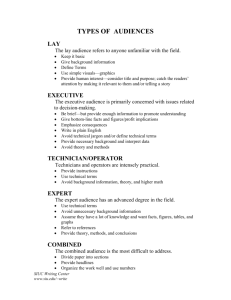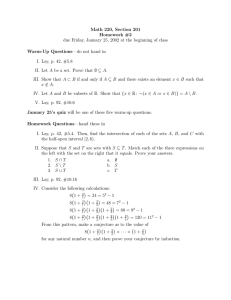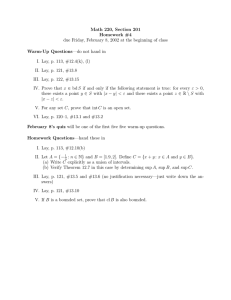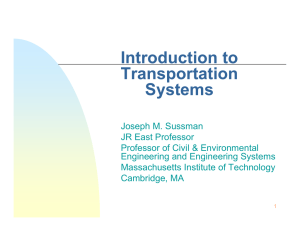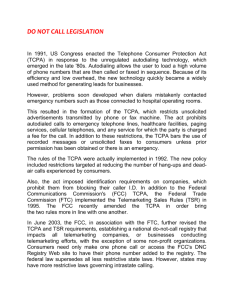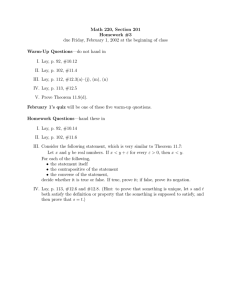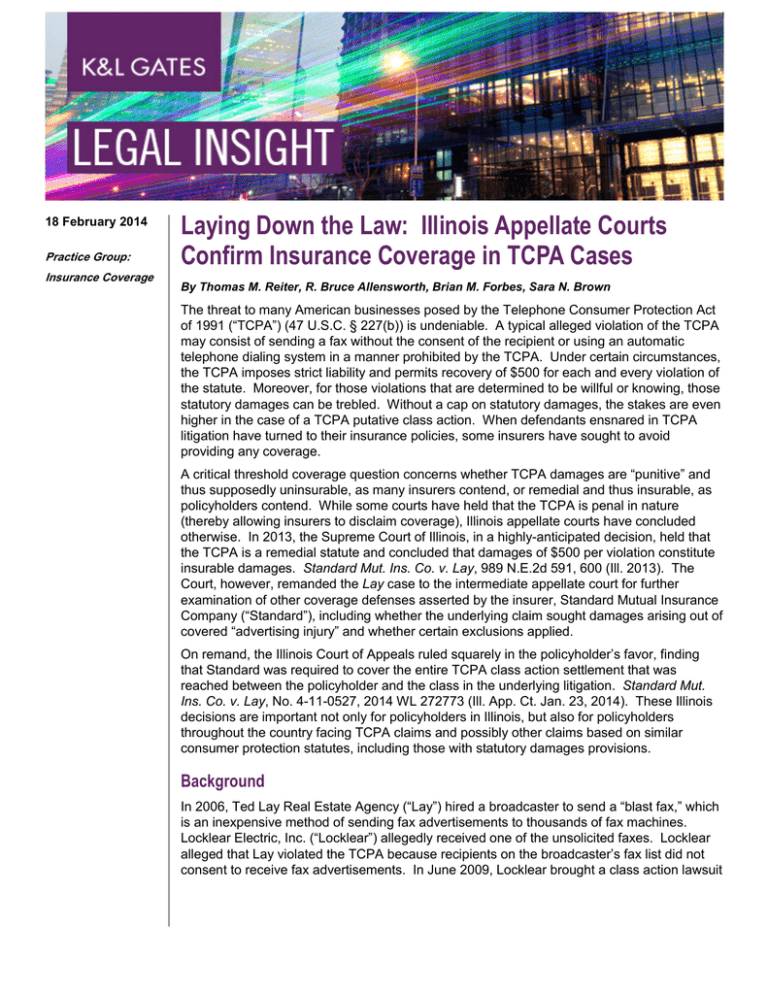
18 February 2014
Practice Group:
Insurance Coverage
Laying Down the Law: Illinois Appellate Courts
Confirm Insurance Coverage in TCPA Cases
By Thomas M. Reiter, R. Bruce Allensworth, Brian M. Forbes, Sara N. Brown
The threat to many American businesses posed by the Telephone Consumer Protection Act
of 1991 (“TCPA”) (47 U.S.C. § 227(b)) is undeniable. A typical alleged violation of the TCPA
may consist of sending a fax without the consent of the recipient or using an automatic
telephone dialing system in a manner prohibited by the TCPA. Under certain circumstances,
the TCPA imposes strict liability and permits recovery of $500 for each and every violation of
the statute. Moreover, for those violations that are determined to be willful or knowing, those
statutory damages can be trebled. Without a cap on statutory damages, the stakes are even
higher in the case of a TCPA putative class action. When defendants ensnared in TCPA
litigation have turned to their insurance policies, some insurers have sought to avoid
providing any coverage.
A critical threshold coverage question concerns whether TCPA damages are “punitive” and
thus supposedly uninsurable, as many insurers contend, or remedial and thus insurable, as
policyholders contend. While some courts have held that the TCPA is penal in nature
(thereby allowing insurers to disclaim coverage), Illinois appellate courts have concluded
otherwise. In 2013, the Supreme Court of Illinois, in a highly-anticipated decision, held that
the TCPA is a remedial statute and concluded that damages of $500 per violation constitute
insurable damages. Standard Mut. Ins. Co. v. Lay, 989 N.E.2d 591, 600 (Ill. 2013). The
Court, however, remanded the Lay case to the intermediate appellate court for further
examination of other coverage defenses asserted by the insurer, Standard Mutual Insurance
Company (“Standard”), including whether the underlying claim sought damages arising out of
covered “advertising injury” and whether certain exclusions applied.
On remand, the Illinois Court of Appeals ruled squarely in the policyholder’s favor, finding
that Standard was required to cover the entire TCPA class action settlement that was
reached between the policyholder and the class in the underlying litigation. Standard Mut.
Ins. Co. v. Lay, No. 4-11-0527, 2014 WL 272773 (Ill. App. Ct. Jan. 23, 2014). These Illinois
decisions are important not only for policyholders in Illinois, but also for policyholders
throughout the country facing TCPA claims and possibly other claims based on similar
consumer protection statutes, including those with statutory damages provisions.
Background
In 2006, Ted Lay Real Estate Agency (“Lay”) hired a broadcaster to send a “blast fax,” which
is an inexpensive method of sending fax advertisements to thousands of fax machines.
Locklear Electric, Inc. (“Locklear”) allegedly received one of the unsolicited faxes. Locklear
alleged that Lay violated the TCPA because recipients on the broadcaster’s fax list did not
consent to receive fax advertisements. In June 2009, Locklear brought a class action lawsuit
Laying Down the Law: Illinois Appellate Courts Confirm Insurance
Coverage in TCPA Cases
against Lay seeking, among other things, the TCPA-prescribed damages of $500 per
violation. 1
Lay tendered its defense to Standard, which had issued a commercial general liability
insurance policy and a business liability insurance policy. Standard agreed to defend Lay
under a reservation of rights. Thereafter, Standard filed a declaratory judgment action
against Lay and Locklear seeking a declaration that Standard had no duty to defend or
indemnify Lay. In response, Locklear sought a declaration that the policies covered Lay for
the TCPA damages and required Standard to defend and indemnify Lay.
While the coverage dispute remained pending, Lay settled with the class for the full amount
sought in the complaint ($1,737,500 plus costs). Pursuant to the settlement agreement,
Locklear agreed it would seek satisfaction of the judgment only from Lay’s insurance policies
even if a court determined that Standard did not owe Lay coverage. In return, Lay assigned
its claims against and rights to payments from Standard to the class. 2
In the coverage action, the trial court found that Lay was not entitled to coverage and granted
Standard’s motion for summary judgment. The intermediate appellate court affirmed,
concluding that the TCPA-prescribed damages of $500 per violation constituted nonrecoverable punitive damages. Due to that determination, the appellate court did not
address additional coverage arguments.
On appeal, the Illinois Supreme Court disagreed with the lower court and held that “[t]he
manifest purpose of the TCPA is remedial and not penal.” 3 Examining Congressional intent,
the Court determined that “Congress intended the $500 liquidated damages available under
the TCPA to be, at least in part, an incentive for private parties to enforce the statute.” 4
Further, the Court concluded that the possibility of treble damages did not transform the
TCPA into a penal statute, because such damages were “intended as a supplemental aid to
enforcement rather than as a punitive measure.” 5 The Court also rejected decisions from
other jurisdictions that held that the TCPA-prescribed damages constituted penal or punitive
damages and instead relied on cases that “ascertained the true intent of Congress in
enacting the TCPA.” 6 The Court remanded the case to the intermediate appellate court for
consideration of the remaining coverage defenses.
The Court of Appeals Decision
On remand, the Illinois Court of Appeals made numerous pro-policyholder determinations. 7
Among other things, the court held that there was advertising coverage under Standard’s
“personal and advertising injury” provision because the faxes were sent without the
permission of the recipients in violation of their right to privacy. 8 The court also held that the
“professional services” exclusion was inapplicable, because Lay was a real estate agency,
1
Standard Mut. Ins. Co. v. Lay, 989 N.E.2d 591, 594 (Ill. 2013).
Id. at 594-95.
3
Id. at 599.
4
Id. at 600 (“Whether we view the $500 statutory award as a liquidated sum for actual harm, or as an incentive for
aggrieved parties to enforce the statute, or both, the $500 fixed amount clearly serves more than purely punitive or
deterrent goals.”).
5
Id. (internal quotation omitted).
6
Id.
7
Standard Mut. Ins. Co. v. Lay, No. 4-11-0527, 2014 WL 272773 (Ill. App. Ct. Jan. 23, 2014).
8
Id. at *6, ¶ 33.
2
2
Laying Down the Law: Illinois Appellate Courts Confirm Insurance
Coverage in TCPA Cases
not an advertising company, and the TCPA claim against Lay was not made in the course of
Lay performing real estate services. 9 The court rejected Standard’s argument that Lay’s
actions were intentional and, therefore, uninsured. The court determined that the proper
focus was on whether Lay thought it had the authority to send the faxes (which Lay believed
it did), rather than on whether Lay intended to send the faxes.10 Finally, because a conflict
of interest existed, the court held that “Standard had no right to require Lay to obtain
permission to settle the underlying suit or to object to it itself.” 11
Conclusion
In combination, the appellate decisions in Lay provide persuasive and strong support for
policyholders seeking to recover payments for TCPA claims under general liability insurance
policies. Indeed, the effect of these decisions may extend beyond the TCPA context and
encompass claims based on other consumer protection statutes (e.g., the Fair Credit
Reporting Act), where some insurers also have sought to avoid coverage on grounds similar
to those rejected in the Lay decisions. In any case, policyholders facing TCPA claims will
want to carefully review their insurance policies to determine whether they are entitled to the
protections afforded under the reasoning of the Lay decisions.
Authors:
Thomas M. Reiter
thomas.reiter@klgates.com
+1.412.355.8274
R. Bruce Allensworth
bruce.allensworth@klgates.com
+1.617.261.3119
Brian M. Forbes
brian.forbes@klgates.com
+1.617.261.3152
Sara N. Brown
sara.brown@klgates.com
+1.412.355.7426
Anchorage Austin Beijing Berlin Boston Brisbane Brussels Charleston Charlotte Chicago Dallas Doha Dubai Fort Worth Frankfurt
Harrisburg Hong Kong Houston London Los Angeles Melbourne Miami Milan Moscow Newark New York Orange County Palo Alto Paris
Perth Pittsburgh Portland Raleigh Research Triangle Park San Diego San Francisco São Paulo Seattle Seoul Shanghai Singapore Spokane
Sydney Taipei Tokyo Warsaw Washington, D.C. Wilmington
K&L Gates practices out of 48 fully integrated offices located in the United States, Asia, Australia, Europe, the
Middle East and South America and represents leading global corporations, growth and middle-market companies,
9
10
11
Id. at *5, ¶ 28.
Id. at *6, ¶ 31.
Id. at *6, ¶ 35.
3
Laying Down the Law: Illinois Appellate Courts Confirm Insurance
Coverage in TCPA Cases
capital markets participants and entrepreneurs in every major industry group as well as public sector entities,
educational institutions, philanthropic organizations and individuals. For more information about K&L Gates or its
locations, practices and registrations, visit www.klgates.com.
This publication is for informational purposes and does not contain or convey legal advice. The information herein should not be used or relied upon in
regard to any particular facts or circumstances without first consulting a lawyer.
© 2014 K&L Gates LLP. All Rights Reserved.
4


